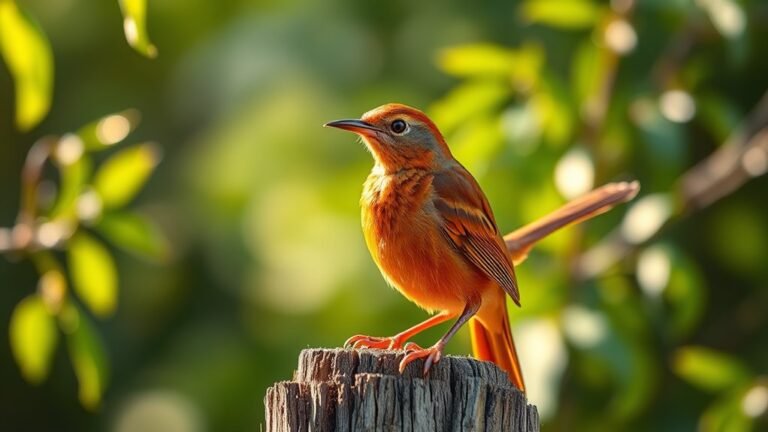Do Birds Enjoy Music? Exploring Their Musical Preferences
Do birds enjoy music? Recent studies suggest they may. Researchers have observed that birds react to different music styles, showing clear preferences. Some birds respond positively to certain rhythms and melodies. This raises questions about how birds experience sound compared to humans. Understanding birds' musical tastes can provide insights into their behavior and communication. It also helps us learn more about our relationship with these creatures. What does this reveal about the connection we share with birds?
Key Takeaways
Birds can have their own music preferences. Research shows that some birds respond well to classical and jazz music. When birds listen to music, their activity levels can increase, and they become more engaged.
Calm music can soothe birds that are feeling stressed. This effect is similar to music therapy, which helps with emotional well-being. However, loud sounds can raise stress in birds. This suggests that they prefer softer music.
Cultural influences also play a role in birds' interactions with music. Traditional music can sometimes imitate bird calls, creating a connection between the two.
The Science Behind Avian Hearing

Birds have a unique ability to hear sounds in ways humans cannot. They can detect a wider range of sound frequencies. Their ears are specially shaped to pick up small changes in sound. This ability is vital for communication and understanding their environment.
When you watch birds, notice how they react to different sounds. Their skills in distinguishing pitches and tones are crucial for their interactions. For example, birds use specific calls for mating or alerting others to danger.
This ability to hear well helps birds survive and thrive in nature. It also connects them closely to their surroundings. Learning about how birds hear enhances our appreciation for their lives and fosters a connection to the avian community.
Birdsong vs. Human Music: A Comparative Study
Birds hear well, which helps them survive and communicate through birdsong.
Birdsong has developed over many years and serves specific purposes like social interactions and mating.
In contrast to human music, birdsong is usually shorter, repetitive, and focused on communication.
Human music can be complex, emotional, and abstract, expressing a wider range of feelings and concepts.
Birds react to sounds, pitches, rhythms, and melodies.
Both birds and humans have a natural connection to sound, but they express it differently.
Understanding these differences helps us appreciate bird behavior and the important role of music in different species.
Genres of Music: What Do Birds Prefer?

Birds can have different music preferences. Studies show that some bird species like classical music, while others enjoy jazz. These preferences reveal that birds may have unique musical tastes.
Music exposure is important. If birds hear a specific genre often, they may respond better to it.
For example, playing classical music around certain birds could make them more active and engaged. Understanding these preferences helps us appreciate the sensory experiences of birds.
The Impact of Music on Bird Behavior
Music influences bird behavior significantly. Certain melodies can calm distressed birds or encourage them to sing. This effect is similar to music therapy, which uses sound to improve well-being in various animals, including birds.
The sounds in their environment can also affect how birds interact and search for food. For example, soothing music creates a calm setting, leading to less aggressive behavior among birds. In contrast, loud or chaotic sounds can raise their stress levels.
Case Studies: Birds and Their Musical Experiences

Human-made soundscapes provide important insights into bird behavior.
Bird musicology studies how various species show different sound preferences. For example, research with finches shows that they respond to genres like classical and jazz based on their environment.
Social interactions in parakeets reveal their love for upbeat rhythms, which often leads to vocal mimicry. This displays their interactive nature.
Doves prefer softer and melodic tunes.
These studies reveal the connections between birds and music. They show how music affects birds emotionally and cognitively.
Understanding these relationships allows us to appreciate the unique ways birds experience sound.
The Role of Rhythm and Melody in Bird Songs
Birds create fascinating vocalizations, using rhythm and melody in their songs. When you watch birds in the wild, you'll hear clear rhythm patterns. These patterns help birds communicate messages, establish territory, and attract mates.
The melody in bird songs also adds depth, allowing birds to express emotions and showcase their individuality. Each bird species has its own unique mix of rhythms and melodies, which convey different meanings and feelings.
Cultural Variations in Bird Music Appreciation
People across cultures appreciate bird songs in different ways. Cultural influences shape how communities connect with avian melodies. In some areas, traditional songs mimic bird calls, showing a close relationship between nature and culture.
In other places, unique rhythms create different musical interpretations. Certain birds, like warblers and thrushes, are important in local stories and rituals.
As you explore these cultural differences, think about how your experiences with bird music link to your community. Understanding these variations can help you feel more connected to your local musical scene.
Enjoy the beauty of bird songs and notice how they resonate with your culture.
Implications for Bird Conservation and Human Interaction
Understanding bird songs across cultures helps us see how human actions affect bird populations. Engaging with birds through music and sound can support conservation efforts.
Here are some actions you can take for bird conservation:
- Support local initiatives that protect bird habitats.
- Start community programs to promote birdwatching and listening.
- Use music that mimics bird songs to spark public interest.
- Advocate for reducing noise pollution to help birds communicate better.
- Teach others why bird diversity is important.
Frequently Asked Questions
Can Different Bird Species Have Unique Musical Preferences?
Different bird species can have unique musical preferences. Studies show that the habitat of each species can influence its sound choices. Environmental factors affect the sounds birds hear, leading to distinct listening experiences for different species.
Do Birds Recognize Familiar Songs or Melodies?
Many birds show they can recognize songs by connecting melodies to certain events or places. This ability highlights their intelligence and shows they can understand their soundscape and social interactions well. Birds can remember and distinguish familiar tunes, which helps them communicate and navigate their environment effectively.
How Does Environmental Noise Affect Birds' Music Enjoyment?
Environmental noise from urban areas disrupts birds' communication and enjoyment of music. In natural habitats, birds thrive and harmonize easily with their surroundings. However, in urban settings, loud sounds can limit their musical expression and social interactions. This can affect their ability to find mates and establish connections with other birds. Less noise can help birds sing and connect better, enhancing their overall well-being.
Are There Specific Sounds That Disturb Birds?
Loud and sudden noises can disrupt bird communication. These sounds create stress for birds, making it difficult for them to interact and connect with one another. This disruption can affect their social behavior and overall health in their environment.
Do Pet Birds Prefer Music Over Silence?
Your pet bird may respond differently to various music volumes. Pay attention to their reactions. If they show excitement or energy with certain music, it may mean they prefer sound over silence. This can help create a more stimulating environment and support their emotional well-being.

Ava is a bird enthusiast and nature lover who has spent countless hours observing and learning about the fascinating world of birds. With a passion for sharing her knowledge and inspiring others to appreciate the beauty of birds, Ava writes about her experiences and insights on avianadmirer.com.







